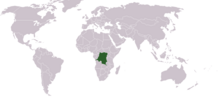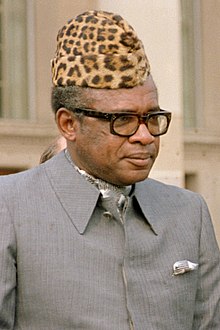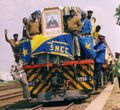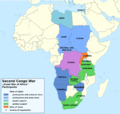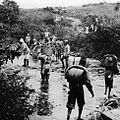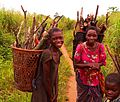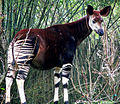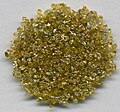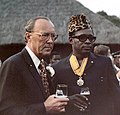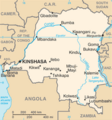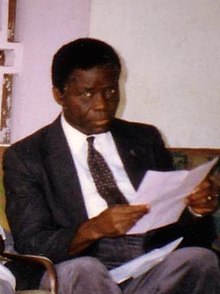Portal:Democratic Republic of the Congo
The Democratic Republic of the Congo Portal
The Democratic Republic of the Congo, also known as Congo-Kinshasa, Congo-Zaire, Congo DR, DR Congo, DRC, or simply either Congo or the Congo, is a country in Central Africa. By land area, the DRC is the second-largest country in Africa and the 11th-largest in the world. With a population of around 105 million, the Democratic Republic of the Congo is the most populous Francophone country in the world, and the fourth-largest in Africa. The national capital and largest city is Kinshasa, which is also the economic center. The country is bordered by the Republic of the Congo, Central African Republic, South Sudan, Uganda, Rwanda, Burundi, Tanzania (across Lake Tanganyika), Zambia, Angola, the Cabinda exclave of Angola, and the South Atlantic Ocean. Centered on the Congo Basin, the territory of the DRC was first inhabited by Central African foragers around 90,000 years ago and was reached by the Bantu expansion about 3,000 years ago. In the west, the Kingdom of Kongo ruled around the mouth of the Congo River from the 14th to 19th centuries. In the northeast, center, and east, the kingdoms of Azande, Luba, and Lunda ruled from the 16th and 17th centuries to the 19th century. King Leopold II of Belgium formally acquired rights to the Congo territory from the colonial nations of Europe in 1885 and declared the land his private property, naming it the Congo Free State. From 1885 to 1908, his colonial military forced the local population to produce rubber and committed widespread atrocities. In 1908, Leopold ceded the territory, which thus became a Belgian colony. Congo achieved independence from Belgium on 30 June 1960 and was immediately confronted by a series of secessionist movements, the assassination of Prime Minister Patrice Lumumba, and the seizure of power by Mobutu Sese Seko in a 1965 coup d'état. Mobutu renamed the country Zaire in 1971 and imposed a harsh personalist dictatorship until his overthrow in 1997 by the First Congo War. The country then had its name changed back and was confronted by the Second Congo War from 1998 to 2003, which resulted in the deaths of 5.4 million people. The war ended under President Joseph Kabila, who governed the country from 2001 to 2019 and under whom human rights in the country remained poor and included frequent abuses such as forced disappearances, torture, arbitrary imprisonment and restrictions on civil liberties. Following the 2018 general election, in the country's first peaceful transition of power since independence, Kabila was succeeded as president by Félix Tshisekedi, who has served as president since. Since 2015, the Eastern DR Congo has been the site of an ongoing military conflict in Kivu. The Democratic Republic of the Congo is extremely rich in natural resources but has suffered from political instability, a lack of infrastructure, corruption, and centuries of both commercial and colonial extraction and exploitation, followed by more than 60 years of independence, with little widespread development. Besides the capital Kinshasa, the two next largest cities, Lubumbashi and Mbuji-Mayi, are both mining communities. The DRC's largest export is raw minerals, with China accepting over 50% of its exports in 2019. In 2021, DR Congo's level of human development was ranked 179th out of 191 countries by the Human Development Index and is classed as a least developed country by the UN. , following two decades of various civil wars and continued internal conflicts, around 600,000 Congolese refugees were still living in neighbouring countries. Two million children risk starvation, and the fighting has displaced 4.5 million people. The country is a member of the United Nations, Non-Aligned Movement, African Union, COMESA, Southern African Development Community, Organisation Internationale de la Francophonie, and Economic Community of Central African States. (Full article...) Selected article -Mobutu Sese Seko Kuku Ngbendu wa za Banga (/məbuːˈtuː ˈsɛseɪ ˈsɛkoʊ/ ; born Joseph-Désiré Mobutu; 14 October 1930 – 7 September 1997), commonly known as Mobutu Sese Seko or simply just Mobutu and also by his initials MSS, was a Congolese politician and military officer who was the 1st and only President of Zaire from 1971 to 1997. Previously, Mobutu served as the 2nd President of the Democratic Republic of the Congo from 1965 to 1971. He also served as the 5th Chairman of the Organisation of African Unity from 1967 to 1968. During the Congo Crisis, Mobutu, serving as Chief of Staff of the Army and supported by Belgium and the United States, deposed the democratically elected government of left-wing nationalist Patrice Lumumba in 1960. Mobutu installed a government that arranged for Lumumba's execution in 1961, and continued to lead the country's armed forces until he took power directly in a second coup in 1965. To consolidate his power, he established the Popular Movement of the Revolution as the sole legal political party in 1967, changed the Congo's name to Zaire in 1971, and his own name to Mobutu Sese Seko in 1972. Mobutu claimed that his political ideology was "neither left nor right, nor even centre", though nevertheless he developed a regime that was intensely autocratic. He attempted to purge the country of all colonial cultural influence through his program of "national authenticity". Mobutu was the object of a pervasive cult of personality. During his rule, he amassed a large personal fortune through economic exploitation and corruption, leading some to call his rule a "kleptocracy". He presided over a period of widespread human rights violations. Under his rule, the nation also suffered from uncontrolled inflation, a large debt, and massive currency devaluations. (Full article...)General images -The following are images from various Democratic Republic of the Congo-related articles on Wikipedia.
This is a Good article, an article that meets a core set of high editorial standards.
 South Kasai (French: Sud-Kasaï) was an unrecognised secessionist state within the Republic of the Congo (the modern-day Democratic Republic of the Congo) which was semi-independent between 1960 and 1962. Initially proposed as only a province, South Kasai sought full autonomy in similar circumstances to the much larger neighbouring state of Katanga, to its south, during the political turmoil arising from the independence of the Belgian Congo known as the Congo Crisis. Unlike Katanga, however, South Kasai did not explicitly declare full independence from the Republic of the Congo or reject Congolese sovereignty. The South Kasaian leader and main advocate, Albert Kalonji, who had represented a faction of the nationalist movement (the Mouvement National Congolais-Kalonji or MNC-K) before decolonisation, exploited ethnic tensions between his own ethnic group, the Baluba, and the Bena Lulua to create a Luba-focused state in the group's traditional heartland in the south-eastern parts of the Kasai region. As sectarian violence broke out across the country, the state declared its secession from the Congo on 9 August 1960 and its government and called for the Baluba living in the rest of the Congo to return to their "homeland". Kalonji was appointed President. Although the South Kasaian government claimed to form an autonomous part of a federal Congo-wide state, it exercised a degree of regional autonomy and even produced its own constitution and postage stamps. The state, supported by foreign powers, particularly Belgium, and funded by diamond exports, managed numerous crises, including those caused by the large emigration of Luba refugees, but became increasingly militarist and repressive. (Full article...)This is a Featured article, which represents some of the best content on English Wikipedia..
Marcel Antoine Lihau or Ebua Libana la Molengo Lihau (29 September 1931 – 9 April 1999) was a Congolese jurist, law professor and politician who served as the inaugural First President of the Supreme Court of Justice of the Congo from 1968 until 1975, and was involved in the creation of two constitutions for the Democratic Republic of the Congo. Lihau attended the Catholic University of Leuven in Belgium with the help of sympathetic Jesuit educators, becoming one of the first Congolese to study law. While there he encouraged Congolese politicians to form an alliance that allowed them to secure the independence of the Congo from Belgium. He served briefly as a justice official and negotiator for the Congolese central government before being appointed to lead a commission to draft a permanent national constitution. He was made dean of law faculty at Lovanium University in 1963. The following year he helped deliver the Luluabourg Constitution to the Congolese, which was adopted by referendum. (Full article...)
WikiProjectsTopicsCategoriesRelated portalsAssociated WikimediaThe following Wikimedia Foundation sister projects provide more on this subject:
Discover Wikipedia using portals | ||||||



